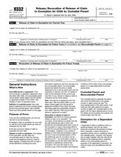Form 8332 Must Be Submitted With Your Return
If A Noncustodial Parent Wishes to Receive the Dependency Exemption for a Child
There has been an important 2011 change in IRS policies with regard to
the paperwork that is required in order for a non-custodial parent to
claim and receive dependency exemptions relating to children.
IRC section 152(c) permits a custodial parent, where a minor child resides
with that parent for more than half the year as the child's principal
place of abode, to claim a Dependency Exemption. This exemption can be
released to the other parent.
However, the Tax Court issued an opinion in late 2011 holding that a noncustodial
parent was not entitled to a dependency exemption deduction or the Child
Tax Credit for his minor child, where the divorce decree stipulated that
the noncustodial parent (the father) would be entitled to take his son
as a dependent if he kept current on his child support payments. (Defernez v. Comm. TCS 2011-87). The mother did not sign a Form 8332 or similar declaration
stating that she would not claim the dependency exemption, and indeed
claimed it despite the language in the judgment. Father was therefore
denied the credit.
Similarly, the tax court ruled last year that a noncustodial taxpayer
who attached a pre-2009 divorce decree to his return was insufficient
to entitle him to a credit because the decree failed to contain the custodial
parent's Social Security number or the years to which it applied. (Briscoe v. Comm. TCM 2011-165).
It used to be that a custodial parent could release his or her claim to
the dependency exemption by signing Form 8332 or "a similar statement"
to enable the noncustodial parent to claim the dependent - these are to
be attached to the noncustodial parent's tax return.
The "similar statement" needed to provide at least the following
information:
- The name of the child
- The name and social security number of the noncustodial parent claiming the exemption deduction
- The social security number of the other parent
- The signature of the custodial parent
- The date of custodial parent's signature
- The year(s) for which the claims are released
However, for divorce decrees (or similar orders) issued after 2008, the
IRS will no longer accept a divorce decree in lieu of of Form 8332 or
the qualifying statement.
For divorce decrees or orders issued before 2009, if the decree or a separation
agreement went into effect after 1984 and before 2009, the noncustodial
parent can attach certain pages from the decree or agreement instead of
Form 8332, provided that these pages provide information that is substantially
similar to 8332. However, to be eligible to do this, the divorce decree
must state:
- That the noncustodial parent can claim the child as a dependent without regard to any condition (i.e., such as the common language that the claiming parent must first be current on their support obligation)
- That the other parent will not claim the child as a dependent; and
- The years for which the claim is released
The noncustodial parent must attach all of the following pages from the decree or agreement:
- A cover page (that includes the other parent's SSN)
- The pages that included all the items described above
- A signature page with the other parent's signature and the date of the agreement
This means that in every child support order from now on (and before as
stated above), particularly where the Court utilizes the guideline formula
(Xspouse, Dissomaster, etc.) and in doing makes assumptions about how
the dependency claims will be distributed, that there must be additional
order directing the custodial parent to sign Form 8332 -
and parties will be very well served to have that form with them at the
hearing so that they can ask the custodial parent to sign it then and there.
Otherwise, a payor noncustodial parent may find that they were ordered
to pay more effective support than they should have on the mistaken belief
that they would be getting a tax savings, only to find that the IRS disallows it.
Here is Form 8332.
Appreciate this page? Why not "Like" Us on Facebook?


